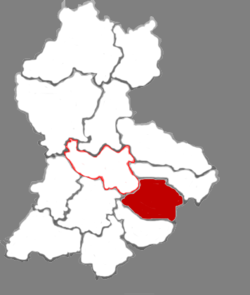Fenyang
Fenyang
汾阳市 | |
|---|---|
 Fenyang in Lüliang | |
| Coordinates: 37°15′42″N 111°46′12″E / 37.2616°N 111.7699°E | |
| Country | People's Republic of China |
| Province | Shanxi |
| Prefecture-level city | Lüliang |
| Time zone | UTC+8 (China Standard) |
Fenyang (simplified Chinese: 汾阳市; traditional Chinese: 汾陽市; pinyin: Fényáng Shì), formerly as Fenyang County (汾阳县) before 1996, is a county-level city under the administration of Lüliang prefecture-level city, in Shanxi Province, China.
Fenyang is located in the wide valley of the Fen River, some 20-plus kilometers west of the actual river.
Fenyang was the birthplace of film director Jia Zhangke. His 1997 film Xiao Wu was filmed in Fenyang. His 2000 film Platform is set from the end of the 1970s to the beginning of the 1990s in and around Fenyang. Subsequently, Jia's 2015 film Mountains May Depart featured scenes set in Fenyang in 1999 and 2014. Fengyang is also the birthplace of Guo Qinglan, (郭庆兰; Guō Qìnglán, the widow of Dwarkanath Kotnis.
Fenyang has a strong reputation within Shanxi for the production of Fenjiu (汾酒;; fénjiǔ), a type of Baijiu known for its superior flavor.
Transportation
External links
- Fenyang government website (in Chinese)
Notes

